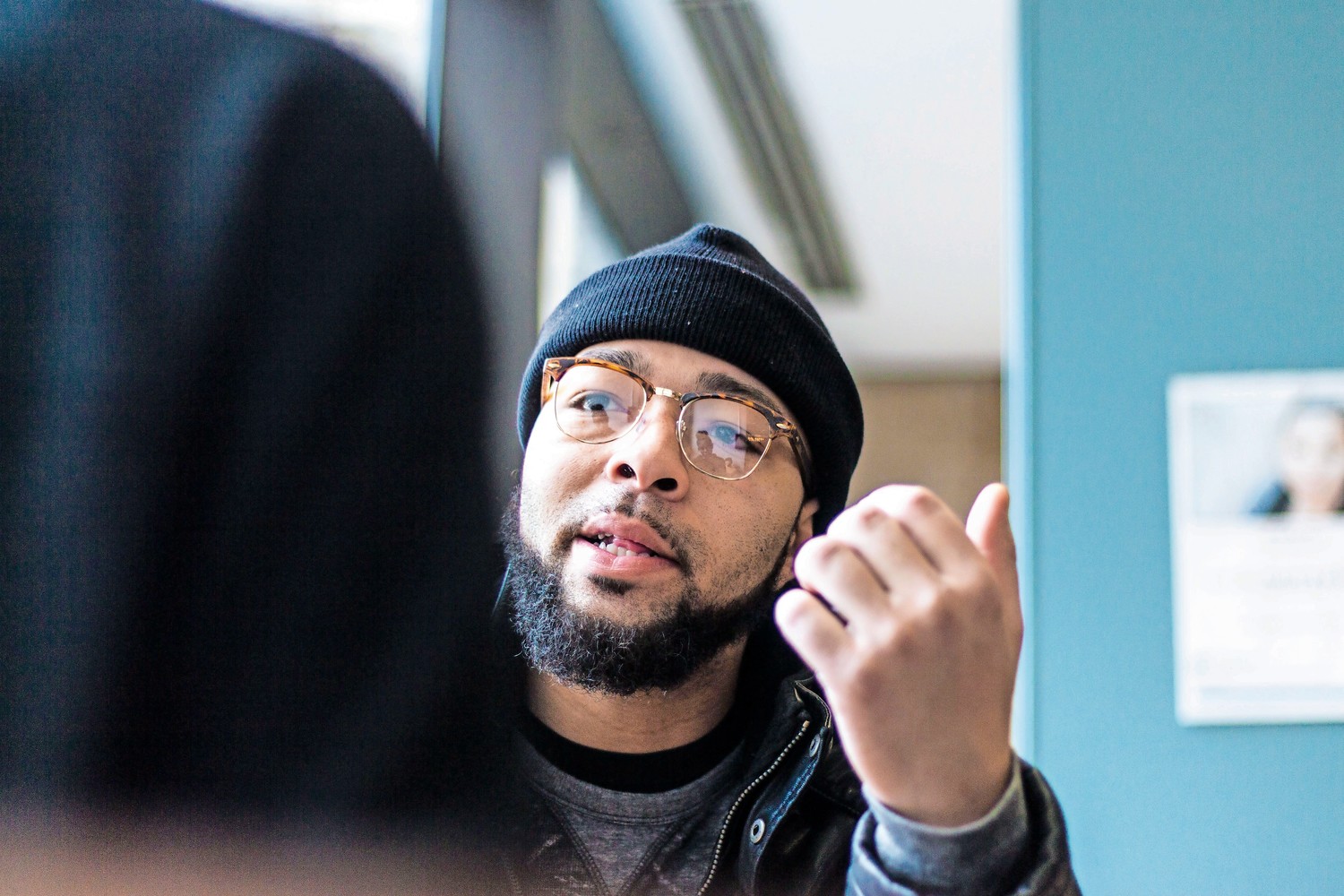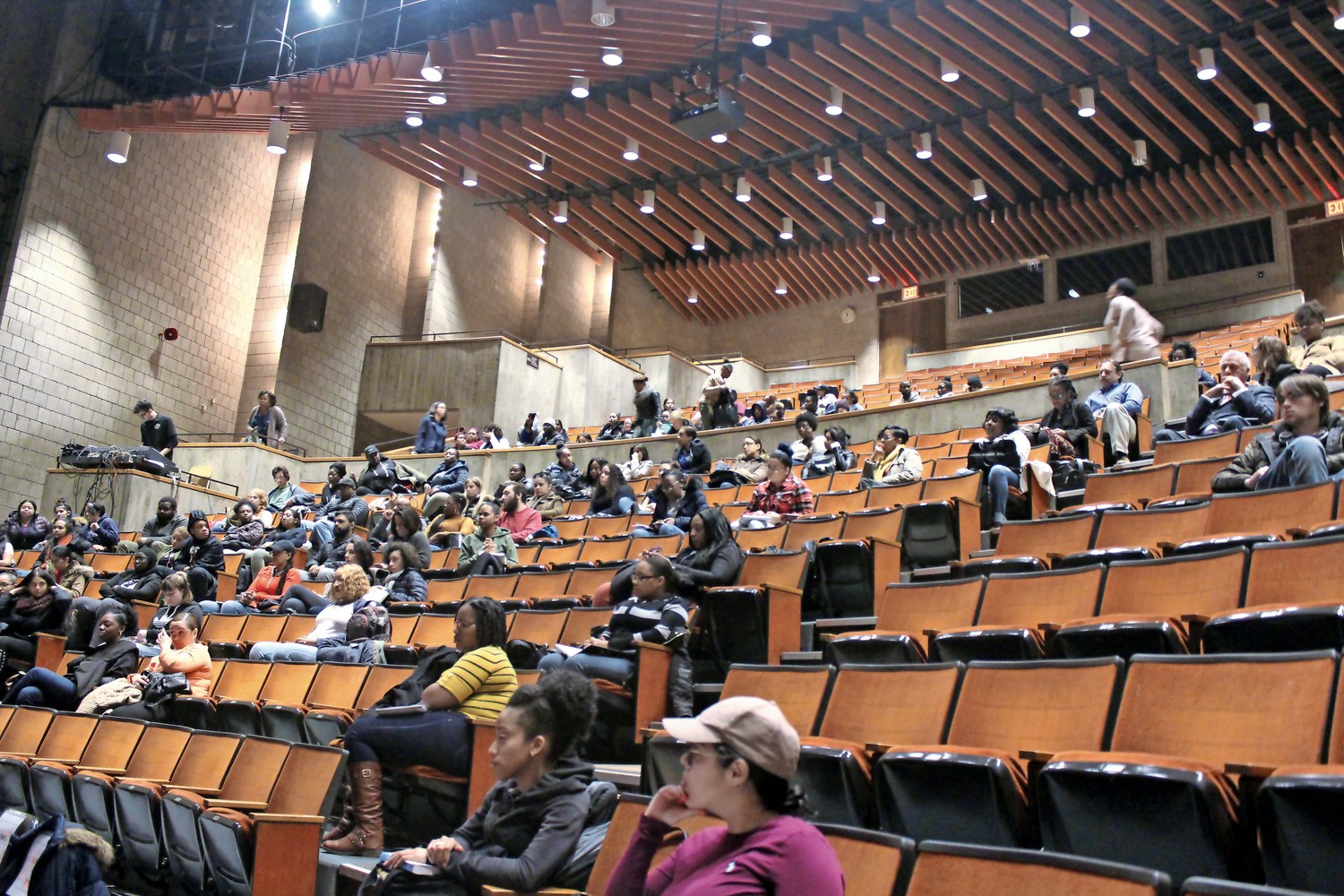Lehman panel paints grim picture of prison system
Damian Stapleton had barely stepped foot on Rikers Island for five minutes when he watched a bloody body wheeled out to an ambulance.
It was a dehumanizing experience Stapleton said more than a decade later, sitting before a Lehman College auditorium of students, sharing what life was like behind bars in the city’s largest — and arguably, most violent — jail.
“You never think you would end up in a situation like that,” Stapleton said. “All together, I gave seven and a half years in the system.”
Stapleton was just 18 years old when he was sent to Rikers in 2007 for robbery. He suffered from — and still suffers from — a level of schizophrenia as well as a mood disorder, similar to bipolar disorder or depression.
These were mental issues Stapleton battled his entire life, and made what he had to face at Rikers even more treacherous — the inhumane living conditions, the cruelty to prisoners. The primary reason why many inmates at Rikers suffer mental deterioration, Stapleton said, is thanks to long bouts of solitary confinement and a “severe culture of violence” not just at Rikers, but in many jails throughout the state.
“When I was in prison, I was sent to solitary for having a book in my cube that was already there, so it was considered possession of stolen property,” Stapleton said. “In solitary, the beds are inside of the wall.”
Stapleton was one of several participants in a panel discussion at Lehman last month, “Resistance Beyond Walls and Borders,” which included the screening of a documentary — “Rikers: An American Jail” — featuring Stapleton and other former inmates like Raymond Yu.
Spending a decade there, Yu described the smell of Rikers as a blend of bleach, dirt and grime.
“It looked like a monster, like we were about to go into the belly of a beast,” Yu said in the film, which focused heavily on the prison experience.
The Lehman panel, however, explored a much different area: The economics of mass incarceration as well as the psychological implications of imprisonment. At Rikers, for example, 40 percent of the detainees are diagnosed with a mental illness.
“Incarceration in New York state literally affects the fabric of our lives and it impacts so much of America,” said a Lehman assistant professor who moderated the event. “So many … utilize human labor from prisons, while it disenfranchises black and brown communities. And it’s horrible.”
If prisons weren’t bad enough, privately owned facilities can be even more troublesome, according to the panelists. These prisons want as many prisoners as possible, because the more people incarcerated, the more money those prisons make.
It is easy for these prisons to make billions in revenue, they said, when prisoner labor is essentially free. This only encourages the government to incarcerate even more people, Stapleton said.
“Sometimes people are forced to says things they didn’t even do when they’re being arrested,” he said.
Companies like Bank of America, Goldman Sachs Group and JP Morgan are primary investors in the prison industrial complex system, profiting from their investments like a business.
“These prisons are generally put in rural places of the U.S. that have extremely high percentages of unemployment,” said Carl Mazza, an associate professor of social studies at Lehman. “You cannot separate incarceration from economics. You cannot separate incarceration from racism.”
In the United States, blacks and Latinos make up a little more than 30 percent of the population. But in prison, they’re almost the majority, making up about half of the incarcerated. And slowly but surely, prison labor has grown — so much, it’s started to take the jobs away in America.
“Incarceration’s an industry,” Mazza said.
For example, during the Obama administration, undocumented immigrants were deported by the masses, leaving a huge gap in the agricultural labor work force. Who to fill that gap? Prisoners.
In fact, it’s not undocumented immigrants picking Georgia onions, Arizona watermelons and Idaho potatoes these days. It’s inmates.
But many people don’t become inmates overnight. Stapleton refers to himself as a “system baby,” someone who was fostered by group homes, detention centers and other forms of government support models that, more often than not, mimic the structure and style of prisons.
Growing up in the Bronx, Stapleton said his grandmother abused him and his siblings. That forced the children from foster home to foster home. On the Lehman panel, Stapleton stressed the importance of a strong family base and how sometimes that can make all the difference in the way a child grows.
Stapleton’s mother was drug-addicted and visited her children when she had money to give, he said. But ultimately she was deemed unfit to care for them. Later, when the state finally allowed Stapleton and his siblings to choose whom they wanted to live with, they picked their aunt because they thought they’d be safe.
“When we got there, she abused us,” Stapleton said. “My aunt didn’t have kids. She didn’t know what she was doing. If we had what we needed, I probably wouldn’t have done what I did.”
Growing up, Stapleton never wanted to be anything special. But he did want to achieve something that could make a difference.
After he was released from an upstate prison, Stapleton learned about people willing to listen and do something about the prison complex. Stapleton decided to use his experiences and what he had endured to help others.
“A court system says you have to be taken away from decent people to a hellhole, and you have to feel some type of way,” Mazza said. “Coming home is hard, and it’s hard to trust and accept people.”
Today Stapleton is a criminal justice reform advocate and motivational speaker who travels across the country sharing his story. Re-entering society after prison can be difficult, but Stapleton said he has the answers to help make it possible.
“Never give up and trust in yourself,” he said. “As long as you live for tomorrow, you always have another chance.”













